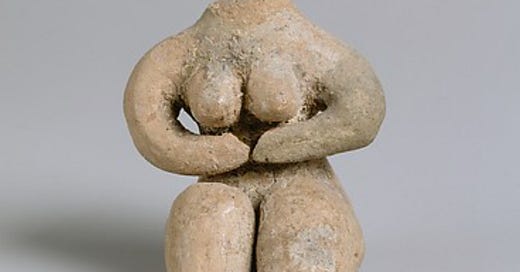Seated female, Halaf, ca. 5600–5000 BCE
Sleeping in the Forest
by Mary Oliver
I thought the earth
remembered me, she
took me back so tenderly, arranging
her dark skirts, her pockets
full of lichens and seeds. I slept
as never before, a stone
on the riverbed, nothing
between me and the white fire of the stars
but my thoughts, and they floated
light as moths among the branches
of the perfect trees. All night
I heard the small kingdoms breathing
around me, the insects, and the birds
who do their work in the darkness. All night
I rose and fell, as if in water, grappling
with a luminous doom. By morning
I had vanished at least a dozen times
into something better.
from Twelve Moons by Mary Oliver, published by Little, Brown, 1978.
Reflections on the Poem
I read this poem first in high school. I fell in love with it, a soothing cadence to repeat to myself. In full high femme mode, I filled the pockets of my own long skirts with seeds and stones.
I wondered what it meant to “vanish into something better”—did it mean merging with something better than a small human self, something such as nature, the universe, earth or god? Or did it mean that she (or I) could become better, ourselves? Could we become better in brief flashes only, or for keeps? Would it require vanishing, leaving the self I knew behind? I wanted to be better, but wasn’t sure how.
The comforting feeling I receive from this poem is that of a benevolent world. The earth as a mother who will tuck you in adoringly, watch over you as you sleep, allow you perfect freedom and to be full of potential at the same time. I want that mothering universe to be known by everyone. I don’t think we have to become any better than we already are, to have it. But if we want to, we can try sleeping in the forest.
Creative Invitation
Spend one hour—or, if you’re able to, three, twelve, or a full 24 —without looking at screens or listening to speakers. Touch the Earth, lay down and stretch out on it.
Draw or describe the quality of the space inside you.




